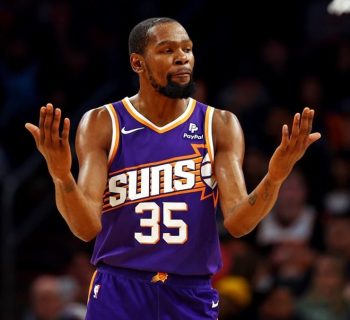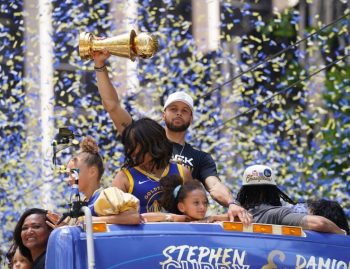NBA
NBA Daily: Looking Back on Phoenix’s Unlikely Playoff Path

The year is 2019. The NBA season had just concluded, and with it, the Phoenix Suns stretched their playoff drought to nine seasons. There were some reasons for hope scattered across those years, but the team was coming off firing its fifth head coach in that span of nine years. From Alvin Gentry to Igor Kokoskov, the Suns just couldn’t seem to find the answer to their head coach conundrum. And then came Monty Williams.
With the Suns eliminating the defending champion Los Angeles Lakers and now sweeping the MVP-led Denver Nuggets, it’s a good time to reflect on how Phoenix got here. Like the Nuggets, and another western playoff contender, the Utah Jazz, the Suns built primarily through smart drafting and excellent free-agent decisions. Let’s take a closer look at how the Suns came to be.
Draft Developments
Of the team’s top six scorers, four of them were drafted by Phoenix. Devin Booker is the most notable Suns draftee on board. Originally an unsuspecting 13th overall pick out of Kentucky, Booker quickly became one of the deadliest players in the NBA. Booker was the lone bright spot of many Phoenix teams, especially across a stretch in which the team took Josh Jackson and Dragan Bender in the top five of their respective draft classes.
Even though he was drafted in 2015, Booker is younger than players like Mikal Bridges, who was drafted in 2018. Those seasons of experience and determination are finally playing dividends for Booker, the face of the franchise. In his first playoff showing, Booker is averaging 27.2 points, 6.3 rebounds and 4.9 assists while shooting 49.4 percent from the field and 39.6 percent from deep.
Outside of the obvious, the Suns have gotten great contributions from their other draft picks. While DeAndre Ayton might not be Luka Doncic, who the Suns passed over, Ayton isn’t making Phoenix regret its decision. Ayton is averaging 15.6 points and 11 rebounds per game in the playoffs while connecting at an outstanding 72.9 percent clip from the field. Ayton is tied for third on the team in defensive rating in the playoffs while leading the team by a healthy margin in offensive rating.
It’s due to Ayton’s hard work ethic that the Suns are as good as they are. In fact, when Ayton is the lead defender on Jokic, the MVP has just 40 points on 39.1 percent shooting from the floor and 20 percent from deep along with four turnovers. It’s hard to shut down someone as offensively fluent as Jokic, but Ayton is the closest thing to a brick wall that Jokic has seen this postseason.
Deandre Ayton on hearing Nikola Jokic said that Ayton gave him problems: “Wow he said that? That’s lit.”
Said he loves playing against Jokic and that’s the MVP of the league.
— Kellan Olson (@KellanOlson) June 8, 2021
Mikal Bridges should’ve been in the Most Improved Player conversation more than he was, as he took an outstanding leap this season after being taken alongside Ayton in the 2018 draft. Bridges blossomed into a three-level scorer in his third season, averaging 13.5 points on a 54.3/42.5/84 shooting line.
Phoenix’s other recent draftee making a splash is Cameron Johnson, who seemed like a huge reach at the time of the 2019 draft. But Johnson and Phoenix are having the last laugh, as Johnson has been able to be plugged in anywhere from the two to the four. Johnson’s production has tapered off a bit in the playoffs as the rotation shortened, but he’s still a consistent three-point shooter, as advertised. In his career, Johnson is averaging 5.2 three-point attempts per game and is connecting on 36.7 percent of those.
Trades
There’s no denying the phenomenal abilities of Chris Paul, but what he’s doing for Phoenix is otherworldly. In-game two against the Nuggets, Paul became the first player in NBA history to have three 15-assist, 0-turnover performances in the playoffs. What’s even wilder is that that mark was set in three different decades, in 2008 with the New Orleans Hornets, in 2014 with the Los Angeles Clippers and now, in 2021, with the Suns.
In exchange for Paul and Abdel Nader, the Suns sent the Oklahoma City Thunder Ricky Rubio, Kelly Oubre Jr., Ty Jerome, Jalen Lecque and a 2022 first-round pick. That’s what it cost for a likely Western Conference Finals appearance.
Adding all of the Suns’ key trades together, this equates to highway robbery:
Sent: Zhaire Smith, Jarrett Culver, Kelly Oubre, Ricky Rubio, Ty Jerome, Jalen Lecque, 2021 1st (Miami), 2022 1st, cash
Received: Mikal Bridges, Cameron Johnson, Dario Saric, Chris Paul, Torrey Craig pic.twitter.com/SG5Xt83YFi
— Evan Sidery (@esidery) June 11, 2021
For a further illustration of Paul’s effect on teams, take a look at the change in win percentage for teams before and after he arrived. The New Orleans/Oklahoma City Hornets went from 18-64 (21.9 win percentage) in 2004-05 to 38-44 (46.3 percent) in his first season. The Clippers went from 32-50 (39 percent) to 40-26 (60.6 percent). The Houston Rockets went from 55-27 (67.1 percent) to 65-17 (79.3 percent). The Oklahoma City Thunder went from 49-33 (59.8 percent) to 44-28 (61.1 percent) and the Suns went from 34-39 (47.2) to 51-21 (70.8). Starting to notice a trend?
Paul’s average change in win percentage in his first season with a team is plus-16.8 percent, an absolutely absurd figure. If you remove that season with the Thunder, that change in win percentage jumps to plus-20.7 percent. However, that season with the Thunder might be Paul’s most impressive campaign. Regardless, it’s clear to see just how much Paul affects winning.
While the Paul trade was obviously phenomenal, the Suns have gotten solid value from lower-end trades. For starters, Phoenix got Torrey Craig from the Milwaukee Bucks at the trade deadline for pennies on the dollar. Craig, as detailed here, has given the Suns a defensive punch off the bench.
Just watch Torrey Craig on this sequence. pic.twitter.com/5uuJNbGUfd
— Jackson Frank (@jackfrank_jjf) June 10, 2021
Craig is the quintessential three-and-D wing, averaging 7.2 points on 36.9 percent shooting from three with Phoenix. In the playoffs, Craig became the defensive specialist of the bench unit, usually playing alongside Cameron Payne and Johnson. While Craig isn’t someone to fill up the stat sheet, getting an energetic contributor in the playoffs for cash is an automatic win.
Jevon Carter is another bright spot from Phoenix’s trading, coming to the team in the 2019 offseason. The Suns departed with former top pick Josh Jackson, alongside De’Anthony Melton, in the trade but got back Carter. While Carter hasn’t been a big part of the rotation this season, he was a huge reason the team went 8-0 in the NBA bubble last season.
Free Agency
The best teams in NBA history play the free-agent market well and fill out their rotations with complementary pieces to boost their teams to the next level. The Phoenix Suns epitomize this with just two key moves that were some of the best in recent memory.
For starters, the Suns signed Jae Crowder in the shortened offseason fresh off his 2020 Finals run with the Miami HEAT. Phoenix got Crowder at an incredibly low $9.3 million price tag for this season and he’s delivering on that contract. Crowder isn’t the type of player to put up 20 points per game or be an excellent shooter, but he’s the perfect glue guy. The forward fits so well on any contender because of his excellent defensive abilities and his new-and-improved ability to knock down the three-ball.
In fact, Crowder is the perfect player to keep on the wings. He’s able to be a complete hound on defense, going up well against names like LeBron James and Giannis Antetokounmpo. Then on offense, Crowder can typically rest in the corner or switch around the arc, pick up a pass from the lead guard and knock it down. 25.5 percent of Crowder’s three-point attempts are from the corner and he’s hitting those at a 40.2 percent clip.
YUP, JAE CROWDER 4 PT PLAY? pic.twitter.com/36q6HHogvN
— ????? (@nyk_lxke) June 8, 2021
However, Crowder isn’t the most impressive free-agent addition by the Suns. Once an afterthought, Cameron Payne became the ultimate role player and playoff hero for Phoenix. Named a Luke Walton All-Star by Zach Lowe of ESPN, Payne thought his career was over in 2020 after the Dallas Mavericks opted to sign Trey Burke before the bubble over him.
“This is why you can’t take nothing for granted in the NBA,” Payne told Lowe. “Appreciate the little things. They can be gone quick.”
It’s clear Payne took his own words to heart, as he ultimately helped to lift Phoenix over the defending champs. In the playoffs, Payne is not only averaging 10.9 points per game on 41.2 percent shooting from three but he’s also done the ever-important job of holding down the fort without Paul on the floor.
In the regular season, Payne quickly earned the trust of the coaching staff and finished with a plus-10 net rating per 100 possessions. Moves like the Payne signing are what make good teams great. Finding diamonds in the rough is a legitimate skill and clearly, it’s paying dividends for the Suns.













